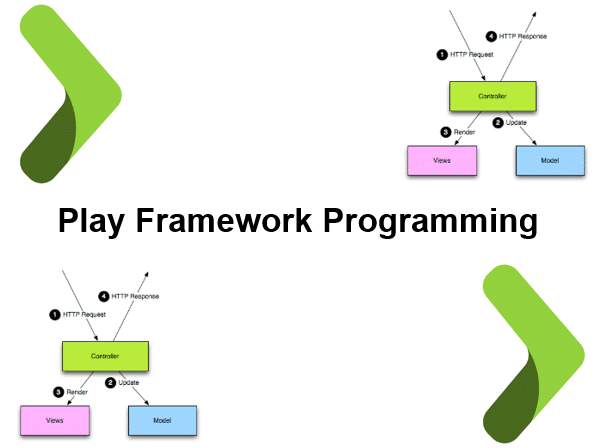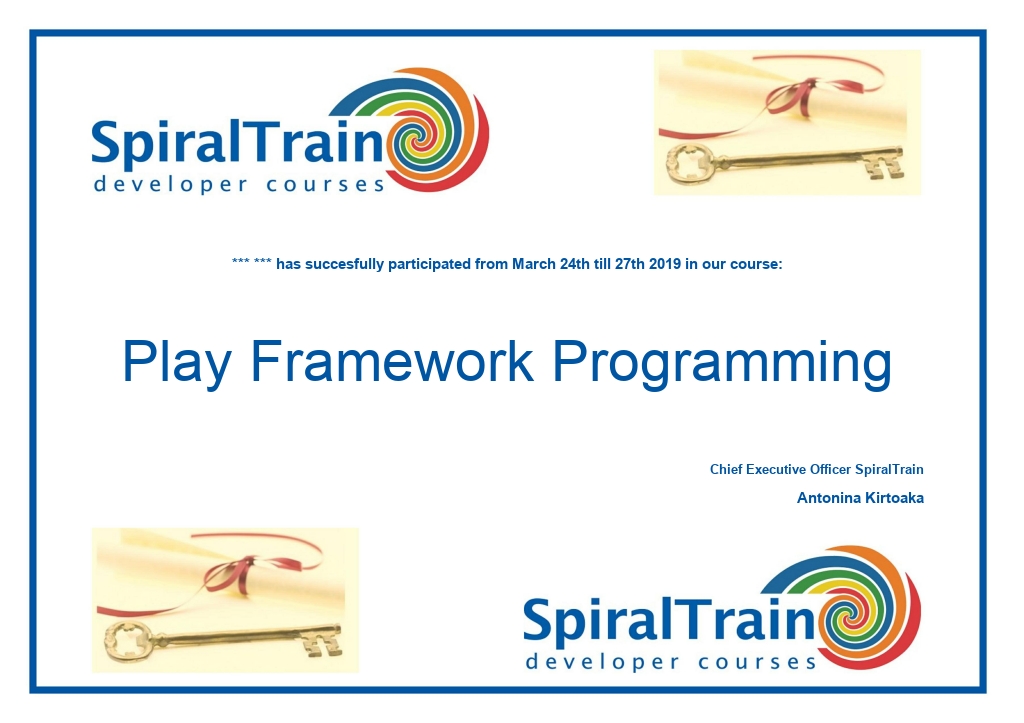-
Learning by doing
-
Trainers with practical experience
-
Classroom training
-
Detailed course material
-
Clear content description
-
Tailormade content possible
-
Training that proceeds
-
Small groups
In the course Play Framework Programming from SpiralTrain participants learn to develop web applications based on the Model View Controller design pattern and using the JVM language Scala. The Play Framework is open source and increases the productivity of developers by using convention over configuration, hot code reloading and error messages in the browser.
The course starts with a discussion of the Play Framework architecture. Also discussed is the use of the build and dependency management tool sbt and the command line utility giter8 with which files and directories are generated based on templates.
Next the MVC architecture is discussed and how in Play control flow, data presentation and data storage are realized. Attention is also paid to dynamic URLs and scoped objects in session and flash scope.
The view in Play web applications is typically based on a template. Attention is paid to the operation of the Scala based template engine and the possible control flow constructs and variables in templates.
Then it's time to handle asynchronous calls and concurrency with multiple threads. The Akka Framework which is ideally suited for concurrent and distributed applications on the JVM, is therefore discussed as well.
The course program also treats consuming Web Services in Play. The parsing of JSON data and the parsing of XML data with JAXB and Akka streaming is also explained.
Furthermore data access from Play is treated. Object Relational Mapping and both Ebean queries and Rawsql queries are discussed.
Finally after an overview of how to create your own Play modules, attention is paid to the deployment of Play Applications on an Apache or Nginx web server.
The course Play Framework Programming is intended for experienced developers who want to use the Play Framework for the creation of Web Applications and Web Services.
Knowledge of and experience with Java, C# or Scala is required to participate in this training.
The theory is discussed on the basis of presentation slides. Demos are used to clarify the theory. There is ample opportunity to practice and theory and exercises are interchanged. The course material is in English. Course times are from 9.30 to 16.30.
After successful completion of the course the participants receive an official certificate Play Framework Programming.

Module 1 : Play Framework Intro |
Module 2 : Build System |
Module 3 : MVC Model |
|
What is Play? Play Architecture Play Versions Installing Play sbt and conscript Installing Giter8 Setting Up Play Project Directories Configuration Controller and View Testing Views Testing Controllers |
Scala Build Tool Core Principles Benefits of sbt Using sbt SBT Commands Setting Definition Resolvers sbt Plugins Application Settings Error Handlers Client Errors Server Errors |
MVC Architecture Separation of Concerns Control Flow Data Presentation Data Storage HTTP Storage Static Definition Dynamic URL Parts Passing Fixed Values Optional Parameters Scoped Objects Session and Flash Scope |
Module 4 : Views and Templating |
Module 5 : Concurrency |
Module 6 : Web Services |
|
General Template Composite View Special @ Character Comments Template Parameters Import Statement Conditions Iterating Lists Iterating Maps If Blocks Escaping Dynamic Contents |
Executors Runnable and Callables Asynchronous Programming Scheduled Jobs Configuring Jobs Akka Framework Actors Actor System Message Flows Fault Tolerance Scalability |
Consuming Web Services REST API's JSON Payloads Callback Methods Handling JSON JSON Request and Response Simple XML Parsing Parsing with JAXB Large Responses Source and Sinks Akka Streaming |
Module 7 : Data Access |
Module 8 : Play Modules |
Module 9 : Deployment |
|
SQL Database Support Object Persistence Object Relational Mapping ORM Concepts Relationships Persistence API Ebean Queries Query Constructs Using Rawsql |
What are Modules? Creating Modules Module Configuration Module Contract Module Injection Publishing Modules Play Repository Third Party Modules Popular Modules |
Action Composition Filters Configuring Cache Cache API Deployment on Apache Enabling SSL mod proxy Load Balancer Nginx Event Architecture Configure Play on Nginx |
